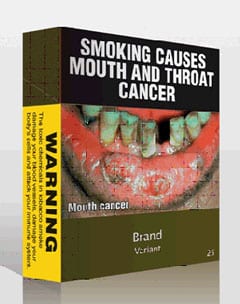Earlier this month, the Australian Bureau of Statistics released figures showing that tobacco and cigarette consumption in Australia have dropped dramatically. Household tobacco consumption and expenditure volume has dropped 17.5% in the last two and a half years.
This extraordinary decline can be linked to two things.
First, Australia has increased taxes twice over the past two years. This connection is not a surprise; taxes have been proven as an extremely effective way to decrease tobacco consumption. But the second implementation is groundbreaking. In December 2012, Australia became the first country in the world to implement standardized (or plain) packaging.
Standardized packaging, also known as plain packaging, refers to tobacco product packaging that is required by law to remove all branding, including colors, images, logos and trademarks. Tobacco corporations are allowed to print only the brand name on the packs, and the name must meet requirements for size, font and placement. The rest of the pack is dedicated to health warnings and other required information.

The goal is to ban colorful, glamorous and exciting tobacco product packaging that so often targets and appeals to young people.
There have been arguments from the tobacco industry that standardized packaging doesn’t work. They argue that it will lead to an increase in illicit sales because it will be easier to counterfeit the packages. In Australia, this has been proven to be extremely exaggerated. Read more here>.
Furthermore, tobacco companies argue that standardized packaging does not decrease smoking. But, the numbers speak for themselves. Australia has clearly proven the tobacco industry wrong.
Several countries, including Ireland, England and Scotland, are working to implement standardized packaging in their countries as well.
We hope that Ireland, England, Scotland and many other countries will follow Australia’s lead to implement standardized packaging and dramatic decrease tobacco consumption. Follow ASH’s blog and news updates for the latest on standardized packaging around the world.



